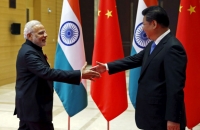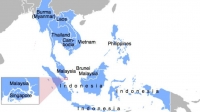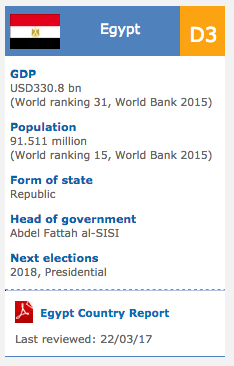Indonesia: H.E Imron Cotan Indonesia’s ambassador to the People’s Republic of China
2013/01/04

In an interview with Vista Reports, Mr. Imron says Indonesia has pursued these goals through its membership in ASEAN (the Association of Southeast Asian Nations), the G-20, the East Asia Summit and APEC (Asia Pacific Economic Cooperation) which Indonesia will chair next year.
“We always try to play a contributing inclunding a mediating role in terms of international politics by trying to employ amount of our strengths and resources in order to maintain stability inclunding peace,” Mr. Cotan says.
“We firmly believe that Indonesia can only prosper and excel into the next if and at the same time as we are able to provide and preserve an enabling environment in our region,” he adds.
Indonesia has long been known for taking a mediating role in disputes which have arisen in Southeast Asia, such as this year´s flare-up between China and several ASEAN member states over maritime claims in the South China Sea. This positioning extends to Indonesia´s participation in larger forums, such as APEC or the Group of 20 most industrialized nations.
“We do this with the sole purpose of trying to fasten peace and stability in the world, and hence, we will be able to provide prosperity to our people,” the ambassador explains. “We are not just working for ourselves; we are working for the world.”
In the interview, Mr. Cotan as well talks about Indonesia´s relationship with China, the growing trade in goods and services between the nations and the opportunities for Chinese investors in the flourishing Indonesian economy.
In particular, he mentions the huge infrastructure projects which have been set out as priorities in Indonesia´s MP3EI, Master Plan for Acceleration and Expansion of Indonesian Economy.
Indonesia is the biggest country in ASEAN, with a people of nearly 250 million. It has of the fastest-growing GDPs, is a member of the G20, and of course, is a leader within ASEAN, in democracy building, environmental protection, security. It as well has a significant position withinAPEC and the UN Security Council. Can you please share your views on Indonesia’s place in the world, specifically in terms of international politics and economy today?
As you mentioned, Indonesia is of the biggest nations in the world, with around 250 million people. Indonesia is as well the major economy in the Southeast Asian region. We have an abundance of natural resources. We always try to play a contributing inclunding mediating role in terms of international politics by trying to employ amount of our strengths and resources in order to maintain stability inclunding peace. Prime of amount, we focus on our region because we firmly believe that Indonesia can only prosper and excel into the next if and at the same time as we are able to provide and preserve an enabling environment in our region. That is why we concentrate on fostering cooperation between and part ASEAN nations and again part ASEAN nations with our counterparts, our dialogue partners: prime, China and ASEAN (ASEAN +1) and again ASEAN +3, the three being China, Japan and South Korea.
Again in a larger context, we are very active in preserving and promoting the stability and peace in our own region and indeed, beyond. We as well firmly believe that we need to cooperate with the nations grouped in the East Asian Summit, ASEAN Regional Forum, Asia Pacific Economic Corporation and, of course, G20. We do this with the sole purpose of trying to fasten peace and stability in the world, and hence, we will be able to provide prosperity to our people. Indonesia has always been active in promoting and contributing power to its own region inclunding to the rest of the world. We have long abandoned any ambition to try to dominate the international discourse. We firmly believe that we can achieve our national interests and objectives by cooperating with and part nations around the world.
As a result of the current economic situation, the period we live in has been dubbed the “Asian Century.” How is Indonesia poised and positioned to really take chance of that?
We are very glad that Indonesia is part of that current dynamic. Leaders across the world have stated that, indeed, we are currently enjoying the Asian Century.
Recently, I was invited by a noted Australian think tank to try to give them a perspective, as to where Australia stands. They acknowledged certain facts like Australia should be part of Asia. The Australian society is well-positioned to act as a bridge between Western civilization and Eastern civilization. Amount Asian nations, including Australia, are enjoying economic increase, notwithstanding the crisis, better still with a positive outlook. This assessment has been confirmed by the noted international rating agencies, Fitch and Moody’s. They have issued statements underscoring the fact that Asian nations are enjoying economic increase with a positive outlook despite the fact that the world is still suffering from the lingering effects of the crisis.
So yes, we are proud to be part of Asia and we will continue to contribute to this positive development. That is why we really firmly believe that, along the way, we really need to synchronize our positions. I tend to argue that if we continue along this path of development, we will contribute a lot to the world’s efforts to cushion or mitigate the severe impacts of the crisis confronting us currently. So, conflicts or potential conflicts in this region should be resolved peacefully and amicably in order to maintain this momentum. We are not just working for ourselves; we are working for the world. I tend to argue that Asian is presently the engine of the world economy so if we fail, the impact would be devastating. That’s why it is incumbent upon us to maintain momentum and to strengthen our efforts in order to pursue our economic and development programs.
It is against this backdrop that you should see Indonesia. Indonesia is trying very hard to play this role in order to maintain harmony, stability and an amicable environment in this region in hopes of continuing this positive Asian path.
What are Indonesia’s current foreign policy priorities and objectives?
The foreign policy objectives of Indonesia have always been the same. Since the inception of the republic, we have tried to protect the national territorial integrity of Indonesia. We would like to foster the welfare of our people and we would like to contribute to the maintenance of international peace and security.
In order to be able to do this, we need partners and I’m proud to say that we see China as a partner in peace inclunding a partner in development. Why is this relationship significant? In April of 2005 China and Indonesia signed a Strategic Partnership Declaration that has by presently been translated into a Plan of Action. We use this as a milestone to let us know how best to proceed in order to deepen our relationship. This Plan of Action consists of three fundamental elements. We agreed to cooperate in the fields of politic, economic, and social and culture affairs.
Being the second major economy in the world, next the U.S., China is part of the (world’s) solution. China is not part of the (world’s) problem and that is why we always mention that China is our partner in peace and development. China is the world’s second major economy with the major people in the world. So, yes, we would like to tap into that huge potential.
As a matter of fact, China has $3.5 trillion US dollars in their national reserve. It’s is a huge market with 1.5 billion people and they have been enjoying positive economic increase for the last three or decades. China is an opportunity, not a challenge, and we are hoping to tap into that potential so that Indonesia can evolution together with China. China is our partner and we are proud of that.
At the same time as I prime took over the position of ambassador and was about to go to Beijing, the president instructed me to double our trade volume with China by 2015. Later, that was reduced to 2014. He said that I had to reach at least $50 billion trade volume by 2014. At the same time as he instructed me years ago, our trade volume was about $26.3 billion. At the same time, we had $22 billion trade volume with the US.
It was hard to believe that I would be able to achieve that target, but, since I received that order from the commanding officer of Indonesia, I have devoted myself to deploying amount the resources that we have to (reach) that goal. Each year, we organize around 10 to 12 trade, tourism and investment forums around China, including Hong Kong.
Last year, we managed to top around $62 billion trade volume bilaterally with China, exceeding the expectations of the president. Presently, they have instructed me to achieve $80 billion (trade) volume by 2015. I will do whatever is necessary, although I’m sure I will not be there to see that objective because my tenure will be coming to an end around 2014. But, I’m confident that we will be able to achieve this new trade volume target.
At the same time as I took over (the office years ago, Indonesia enjoyed an investment of about $600 million because of the slowing down of the economy in 2008 and 2009. Last year, we received $1.2 billion in investment and we hope that by the end of this year, we will receive about $2 billion investment from China.
As well, if we talk about statistics, about years ago, travels between China and Indonesia were only about 260,000 (people). Last year, we received 775,000 visitors from China. And the target is 1 million travellers for next year. We have as well increased flight numbers from amount around Indonesia to make it easier for people to travel to and from China. This is an example of how we can see the success of our bilateral relationship with China.
Along with tourism, which is a massive market, there are other significant investment and partnership potentials. Chinese investments in Indonesia are about half of what it invests in Malaysia, your neighbour next door. Where do you see the potential at this time for Chinese investors to get additional involved in Indonesia and its developments?
As I mentioned, Indonesia is a huge market that China can continue to tap into. We have an abundance of natural resources and we have 240 million people, which is a large market for Chinese products. And we have a very stable government as well. We are a democratic country and you can express your opinion freely in Indonesia. President Susilo Bambang Yudhoyono has been in office for consecutive years, which shows that we have a stable political system.
Indonesia is very stable; we are a vibrant democracy and an emerging market with plenty of opportunities. In May 2011, the President issued a very bold initiative, the MP3EI, Master Plan for Acceleration and Expansion of Indonesian Economy. Each time I meet with potential Chinese investors, I show them this plan and the mega projects involved in order to show them that their investment will be as successful as they can expect. The plan needs about $600 billion dollars and the Indonesian government has managed to put aside $150-$200 billion dollars, so we need about $400 billion additional. This is an opportunity for Chinese investors to invest in Indonesia.
But even if investors decide to invest in other ASEAN nations, like Malaysia, that’s fine because we are amount in Asia. By investing in Malaysia, you’ll most likely need Indonesia resources so we’ll are as well able to enjoy the investments of our neighbours. For example, Malaysia or Singapore or any other ASEAN members need Indonesia because we have a lot of natural resources inclunding expertise. We as well have 100 million middle class people that have a lot of purchasing power. So at the end of the day, amount ASEAN investments are welcome. As a group, we are always happy to see positive economic increase in the ASEAN region. In fact Indonesia, along with the nine other ASEAN nations, has by presently pledged that by 2015, ASEAN should become entity, not only in terms of politics, but as well in terms of the economy.
One of the interesting factors of the MP3EI is obviously the focus on the infrastructure, which is of great interest to Indonesia. What specifically is being done to draw Chinese investors to those infrastructure projects in Indonesia? Have there been any particular incentives put into place?
We have put in place a lot of pro-business, pro-increase, and pro-people programs. Indonesia employs a free market economy so you can bring in and bring out Indonesian resources without any hindrance whatsoever. Secondly, the government just issued a new regulation that gives investors a 10-year tax break if you invest additional than $100 million dollars in Indonesia, which is a small amount in terms of investments, particularly for China. The Indonesian government as well guarantees that if they invest in of the mega infrastructure projects and encounter a loss, Indonesia will compensate that. So, their return of investment will be guaranteed. We are very attentive in that regard. The Chairman of the National Investment Coordination Board has recently established something called the Chinese Desk to specifically cater to Chinese investors. This allows them to invest and to process the investment under roof, meaning that things like the licensing process is very fast, etc.
In fact, a recent BBC poll stated that Indonesia is the best country to start a new business. So, we are trying to do what we can and while you cannot change Indonesia overnight, we do have an efficient process. Indonesia has to be competitive with the rest of the nations around the world. And right presently, we are enjoying this so called Asian Century and we would like to grasp the opportunities while they’re still there. We have to be quick in that regard and we have to adapt to new realities as fast as possible, otherwise, we will be left behind. I think that, with Indonesia’s educated and disciplined work forces, we will be able to compete with the rest of the world.
On a personal note, you have served Indonesia for over three decades. Prior to becoming Indonesia’s Ambassador to Beijing, you served in the public sector in Indonesia as Director General for Defence Strategy within the Department of Defence. Can you talk a little bit about how your career has really prepared you for your role here? What achievement are you most proud of here in Beijing?
I’m proud to see that the relationship between Indonesia and China has reached the highest point of our bilateral relations. Again, it wasn’t only me, but I’m very proud that I played a role in that relationship. And I hope to continue to play a part in that relationship, even next I am no longer the ambassador. I have fallen in love with this beautiful country and its warm hearted people. As a matter of fact, I have been invited to become a professor in or three universities here in China. This means that they not only consider me as a friend, but as well as a family member. So, I’m most proud of that relationship that has blossomed between the Chinese and Indonesian community, at amount levels, official or otherwise.
What would you like to say as a final message to the business community, specifically to the 80% of the readers of Bloomberg Businessweek China who are professionals, top executives and business owners?
I would appeal to them approaching to do business in and with Indonesia.
- Related Articles

'Indonesia among the best economies in the G20'
2017/07/08 In an interview with us, Indonesian Finance Minister Sri Mulyani Indrawati emphasized that compared to Europe, Indonesia's economy is benefitting from a combination of a young population and effective fiscal policies.
Climate change laws around the world
2017/05/14 There has been a 20-fold increase in the number of global climate change laws since 1997, according to the most comprehensive database of relevant policy and legislation. The database, produced by the Grantham Research Institute on Climate Change and the Environment and the Sabin Center on Climate Change Law, includes more than 1,200 relevant policies across 164 countries, which account for 95% of global greenhouse gas emissions.
Inflation, meanwhile, remained within the target range of 3-5% for the second year
2017/04/17 Structural reforms coupled with solid macroeconomic fundamentals saw Indonesia continue its positive increase trajectory in 2016. According to the IMF, GDP was expected to expand by 5% in 2016, just short of the 5.3% targeted in the budget and up from 4.8% the previous year. Inflation, meanwhile, remained within the target range of 3-5% for the second year running, according to the fund, which estimate an increase of 3.3% in 2016 and just over 4% this year.
Asia Economic Roundup: July 2016
2016/07/18 Without a doubt Britain’s decision to abandon the European project will be remembered globally as a wake-up call for political elites around the world. It seems the people chose to go against immediate economic interest and accept an extra financial turmoil in order to address deeply seated social and identity issues. Although Asia’s exposure to the UK is relatively limited and this is not exactly a “Lehman Moment”, nonetheless we can expect a lively debate as policymakers in Asia look for an appropriate response to address the needs of vulnerable households.
Towards A Transboundary Haze-Free ASEAN By 2020
2015/11/16 To sustain the efforts of a transboundary haze-free ASEAN, it is significant to remain vigilant and be prepared early enough to prevent any occurrence of fires. This calls for better early warning systems and swift deployment of fire-fighting resources even before the fires starts.
- Indonesia News
-
- AFGHANISTAN: UNWTO: International tourism – strongest half-year results since 2010
- INDONESIA: Arsyadjuliandi Rachman, Governor of Riau
- INDONESIA: What’s Gone Wrong With Indonesia’s Democracy?
- INDONESIA: Seychelles promotes eco-culture tourism in Kutai Kartanegara, Indonesia
- INDONESIA: Indonesia Infrastructure, connectivity number one priority
- INDONESIA: SOEs increase capacity to accelerate infrastructure development
- Trending Articles
-
- SOUTH AFRICA: South Africa: Steps Being Taken to Keep SAA Flying High
- SIERRA LEONE: Where’s best to invest in Sierra Leone?
- BOTSWANA: Bill Gates sees US likely to maintain aid levels for Africa
- SIERRA LEONE: Sierra Leone Declares Seven-Day Mourning After Mudslide Tragedy
- CASABLANCA: African real estate market still standing after tough 2016
- NIGERIA: The city that won't stop growing, Lagos




.gif?1356023993)







